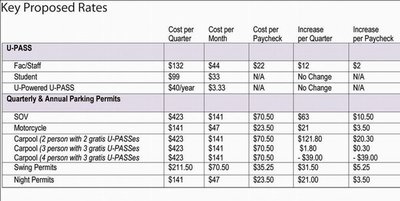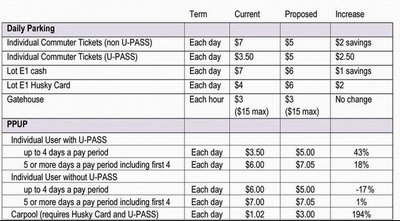April 22, 2010
Commuter Services proposes new transportation and parking rates for 2010-2011
Commuter Services is seeking to increase parking and U-PASS rates to help financially sustain the U-PASS program. The increases are part of a plan to reduce an expected shortfall of $3.5 million resulting from higher transportation costs all around.
In the proposed new fee structure, the cost of a U-PASS for faculty and staff would increase from $40 to $44 a month, or by $2 per paycheck. Parking rates for single-occupancy vehicles would rise from $120 a month to $141, an increase in each pay period of $10.50. The price of student U-PASS, however, would remain unchanged at $33 a month.
A complete list of parking and U-PASS rates, together with the amount and percentage of each proposed increase, is available online here.
If approved by the UW Regents in their June 10 meeting, the new fee structure will go into effect on July 1, the first day of the new fiscal year.
Commuter Services encourages all in the campus community to share their comments about the proposed changes in a public meeting from 12:30 to 2:30 p.m., Monday, May 3, in 310 HUB. Comments can also be submitted online here.
U-PASS partners with six regional transit agencies to provide bus and train service to the University community — King County Metro, Sound Transit, Community Transit, Pierce Transit, Kitsap Transit, and Everett Transit. Funded in large part through sales taxes, these transit providers are facing budget shortfalls and most are considering or are implementing fare increases.
For many, the equation is simple: increase fares or cut services. Unfortunately, the resulting cost increases for U-PASS are not sustainable at the current rate level, even with the significant efficiencies and cost saving measures implemented in the program.
Increases in transit costs — due to fare increases as well as increasing ridership by U-PASS members — comprise the bulk of the $3.5 million deficit projected for Commuter Services for the next fiscal year.
The department is pursuing a combination of approaches to meet the shortfall. The proposed rate increases reflect only about one-third of the gap. The remedy for the remaining two thirds is to come from an ambitious agenda that includes several external cost savings measures as well as program and organizational efficiencies.
Approximately one-third of the funding for U-PASS comes primarily through the revenues generated by parking resources and a strong U-PASS program ensures the availability of parking for those who need it.
In proposing these rate adjustments for U-PASS and parking, Commuter Services considered a range of influences and possible impacts, including:
- The need to maintain and expand access to campus by holding visitors’ parking rates at levels comparable to the cost for parking in the neighboring community.
- The potential for change in participation for all products and programs in response to rate changes.
- The need to stop the attrition of students from the U-PASS program that occurred as a result of the 2009 U-PASS fee increase.
The rate changes proposed to meet budget shortfalls address other issues important to the UW community including:
- Equalizing the discounted occasional parking options available to transit users and active transportation commuters who walk or bike to campus.
- Discontinuing rarely-used products and combining similar products to streamline operations and reduce administrative costs.
- Expanding parking fees for UW-owned vehicles to reflect the cost of providing the parking resources they utilize.
- Establishing a single low rate for parking in E1 with cash or a HuskyCard, maintaining the resource for UW community members who require access to a discounted parking option while simplifying pricing.
- Enhancing campus safety by making campus parking more accessible during nighttime hours.
- Adjusting the Annual/Quarterly Carpool rate to reflect the cost of providing the resource of parking, while continuing to encourage carsharing through cost sharing between carpool members and by providing the benefits of U-PASS membership to carpool participants without requiring the purchase of U-PASS. The proposed fee results in virtually no change in the cost for 3 person carpools and a significant potential savings for carpools of 4 or more.
- Encouraging active commuting by maintaining the cost of U-Powered U-PASS and fees for secure bicycle enclosure parking at 2009-10 levels.



